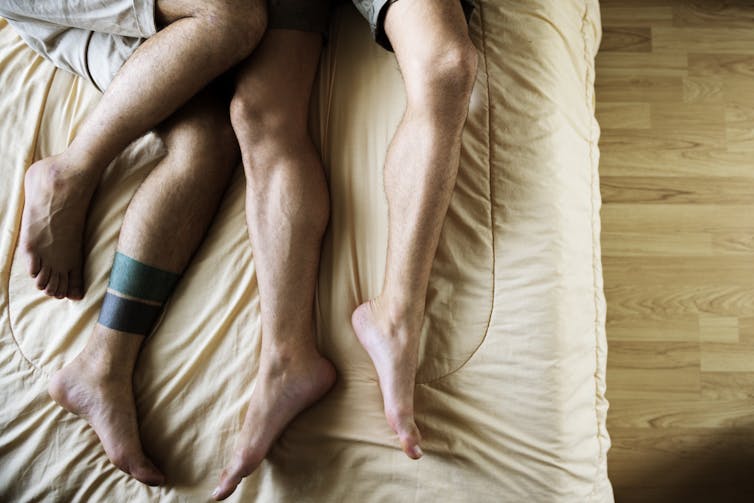Reposted with permission from The Conversation

Sexual identities and sexual behaviours don’t always match because sexuality is multidimensional. Many people recognize sexual fluidity, and some even identify as “mostly straight.”
Fewer people know that some men and women have same-sex encounters, yet nonetheless perceive themselves as exclusively straight. And these people are not necessarily “closeted” gays, lesbians or bisexuals.
When a closeted gay or bisexual man has sex with another man, he views that sex as reflecting his secret identity. He is not open about that identity, likely because he fears discrimination. When a straight man has sex with another man, however, he views himself as straight despite his sex with men.
In my book, Still Straight: Sexual Flexibility among White Men in Rural America, I investigate why some men who identify as straight have sex with other men. Large nationally representative surveys show that hundreds of thousands of straight American men — at least — have had sex with two or more other men. This finding represents a disconnect between identity and behaviour, and researchers from around the world – in the United States, Australia and the U.K. – have studied this topic.
Do experts have something to add to public debate?
It involves two related but separate issues: first, why men identify as straight if they have sex with other men, and second, why straight men would have sex with other men in the first place.
Skirting around cheating
As part of my research, I spoke with 60 straight men who have sex with other men, and specifically looked at men in rural areas and small towns. The majority of men I interviewed were primarily attracted to women, not men. So why would they have sex with other men?
My findings revealed several reasons as to why straight men have sex with other men. Several men explained that their marriages did not have as much sex as they wanted, and while they wanted to remain married, they also wanted to have more sex. Extramarital sex with men, to them, helped relieve their sexual needs without threatening their marriages.
Tom, a 59-year-old from Washington, explained: “I kind of think of it as, I’m married to a nun.” He continued: “For me, being romantic and emotional is more cheating than just having sex.” And Ryan, a 60-year-old from Illinois, felt similarly. He said: “Even when I have an encounter now, I’m not cheating on her. I wouldn’t give up her for that.”
These men felt as though extramarital sex with women would negatively affect their marriages, whereas extramarital sex with men was not as much of an issue. Most men had not told their wives about their extramarital sex, however.

Identities reflect sexual, nonsexual aspects of life
In order to answer why men would identify as straight despite having sex with other men, it’s important to know that sexual identities indicate how people perceive the sexual and nonsexual aspects of their lives. Connor, a 43-year-old from Oregon, noted:
“I think there’s a definite disconnect between gay and homosexual. There’s the homosexual community, which isn’t a community, there’s the homosexual proclivity, and then the gay community. It’s like you can be an athlete without being a jock. And you can be homosexual without being gay, or into all of it. It just becomes so politically charged now.”
The men I talked to identified as straight because they felt that this identity best reflected their romantic relationships with women, their connections to heterosexual communities or the way they understood their masculinity. Straight identification also, of course, meant that they avoided discrimination. They felt that sex with men was irrelevant to their identities given every other part of their lives.
Living in small towns and in more rural settings also shaped how the men perceived themselves. Larry, 37, from Wyoming explained: “I would say straight because that best suits our cultural norms around here.” Most of the men I talked to were happy with their lives and identities, and they did not want to identify as gay or bisexual — not when people asked them, and not to themselves.
It may come as a surprise, but internalized homophobia was not a major reason the men I spoke to identified as straight. Most supported equal legal rights for lesbians, gays and bisexuals. Other research also shows that, on average, straight men who have sex with men are not any more homophobic than other straight men. Additionally, while most men knew bisexual is a valid identity, they felt that bisexual did not describe their identity because they were only romantically interested in women.
Many factors beyond sexual attractions or behaviours shape sexual identification, including social contexts, romantic relationships and beliefs about masculinity and femininity, among others. Straight men who have sex with other men are not necessarily closeted, because they do genuinely see themselves as heterosexual.
Sexual encounters with men simply do not affect how they perceive their identity.
Tony Silva received funding from the Sexualities Project at Northwestern (SPAN) in the form of a postdoctoral fellowship that allowed him to turn this project into a book.
Tony Silva is an assistant Professor of Sociology, University of British Columbia. You can find him on Twitter @Sociology_Silva

Comments